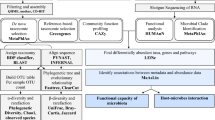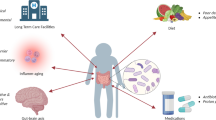Abstract
Rheumatoid arthritis (RA) is more common in women, and many reports of sex differences have been reported in various aspects of RA. However, there has been a lack of specific research on women’s gut flora. To assess the association between the gut flora and RA patients, this study combined the microbiome with metabolomics. Fecal samples from RA patients and healthy controls were collected for 16S rRNA sequencing. Nontargeted liquid chromatography–mass spectrometry was used to detect metabolites in fecal samples. We comprehensively used various analytical methods to reveal changes in intestinal flora and metabolites in female patients. The gut flora of RA patients was significantly different from that of healthy women. The abundance of Bacteroides, Megamonas and Oscillospira was higher in RA patients, while the abundance of Prevotella, Gemmiger and Roseburia was lower than that of healthy women. Gemmiger, Bilophila and Odoribacter represented large differences in microflora between RA and healthy women and could be used as potential microorganisms in the diagnosis. Fatty acid biosynthesis was significantly different between RA patients and healthy women in terms of metabolic pathways. There were different degrees of correlation between the gut flora and metabolites. Lys-Phe-Lys and heptadecasphin-4-enine can be used as potential markers for RA diagnosis. There was an extremely significant positive correlation between Megamonas, Dialister and rheumatoid factors, which was found for the first time. These findings indicated that alterations of these gut microbiome and metabolome may contribute to the diagnosis and treatment of RA patients.





Similar content being viewed by others
Data availability
The data used to support the findings of this study are included within the article.
References
Di Florio DN, Sin J, Coronado MJ, Atwal PS, Fairweather D. Sex differences in inflammation, redox biology, mitochondria and autoimmunity. Redox Biol. 2020;31:101482.
Moorman CD, Sohn SJ, Phee H. Emerging therapeutics for immune tolerance: tolerogenic vaccines, T cell Therapy, and IL-2 therapy. Front Immunol. 2021;12:657768.
Favalli EG, Biggioggero M, Crotti C, Becciolini A, Raimondo MG, Meroni PL. Sex and management of rheumatoid arthritis. Clin Rev Allergy Immunol. 2019;56(3):333–45.
Sparks JA. Rheumatoid arthritis. Ann Intern Med. 2019;170(1):ITC1–16.
Charles J, Britt H, Pan Y. Rheumatoid arthritis. Aust Fam Physician. 2013;42(11):765.
Ortona E, Pierdominici M, Maselli A, Veroni C, Aloisi F, Shoenfeld Y. Sex-based differences in autoimmune diseases. Ann Ist Super Sanita. 2016;52(2):205–12.
Yu C, Liu C, Jiang J, et al. Gender differences in rheumatoid arthritis: interleukin-4 plays an important role. J Immunol Res. 2020;2020:4121524.
Klein SL, Morgan R. The impact of sex and gender on immunotherapy outcomes. Biol Sex Differ. 2020;11(1):24.
Tański W, Dudek K, Tomasiewicz A, Świątoniowska-Lonc N. Sexual dysfunction and quality of life in patients with rheumatoid arthritis. Int J Environ Res Public Health. 2022;19(5):3088.
Nicholson JK, Holmes E, Kinross J, et al. Host–gut microbiota metabolic interactions. Science. 2012;336(6086):1262–7.
Ochoa-Repáraz J, Kirby TO, Kasper LH. The Gut microbiome and multiple sclerosis. Cold Spring Harb Perspect Med. 2018;8(6):a029017.
Xiang K, Wang P, Xu Z, et al. Causal effects of gut microbiome on systemic lupus erythematosus: a two-sample mendelian randomization study. Front Immunol. 2021;12:667097.
Bolyen E, Rideout JR, Dillon MR, et al. Reproducible, interactive, scalable and extensible microbiome data science using QIIME 2. Nat Biotechnol. 2019;37(8):852–7.
Callahan BJ, McMurdie PJ, Rosen MJ, Han AW, Johnson AJ, Holmes SP. Dada2: high-resolution sample inference from illumina amplicon data. Nat Methods. 2016;13(7):581–3.
Katoh K, Misawa K, Kuma K, Miyata T. MAFFT: a novel method for rapid multiple sequence alignment based on fast fourier transform. Nucleic Acids Res. 2002;30(14):3059–66.
Price MN, Dehal PS, Arkin AP. FastTree: computing large minimum evolution trees with profiles instead of a distance matrix. Mol Biol Evol. 2009;26(7):1641–50.
Asnicar F, Weingart G, Tickle TL, Huttenhower C, Segata N. Compact graphical representation of phylogenetic data and metadata with GraPhlAn. PeerJ. 2015;3:e1029.
van Riel PL, Renskers L. The disease activity score (DAS) and the disease activity score using 28 joint counts (DAS28) in the management of rheumatoid arthritis. Clin Exp Rheumatol. 2016;34(5 Suppl 101):S40–4.
Best JH, Kuang Y, Jiang Y, et al. Comparative efficacy (DAS28 remission) of targeted immune modulators for rheumatoid arthritis: a network meta-analysis. Rheumatol Ther. 2021;8(2):693–710.
Avuthu N, Guda C. Meta-analysis of altered gut microbiota reveals microbial and metabolic biomarkers for colorectal cancer. Microbiol Spectr. 2022;10(4):e0001322.
Zhang S, Kong C, Yang Y, et al. Human oral microbiome dysbiosis as a novel non-invasive biomarker in detection of colorectal cancer. Theranostics. 2020;10(25):11595–606.
Yang HT, Liu JK, Xiu WJ, et al. Gut microbiome-based diagnostic model to predict diabetes mellitus. Bioengineered. 2021;12(2):12521–34.
Afridi R, Khan AU, Khalid S, et al. Anti-hyperalgesic properties of a flavanone derivative poncirin in acute and chronic inflammatory pain models in mice. BMC Pharmacol Toxicol. 2019;20(1):57.
Gandhi GR, Vasconcelos ABS, Wu DT, et al. Citrus flavonoids as promising phytochemicals targeting diabetes and related complications: a systematic review of in vitro and in vivo studies. Nutrients. 2020;12(10):2907.
Patel DK. Therapeutic potential of poncirin against numerous human health complications: medicinal uses and therapeutic benefit of an active principle of citrus species. Endocr Metab Immune Disord Drug Targets. 2021;21(11):1974–81.
Sun H, Guo Y, Wang H, et al. Gut commensal Parabacteroides distasonis alleviates inflammatory arthritis. Gut. 2023;72:1664–77. https://doi.org/10.1136/gutjnl-2022-327756.
Cui Y, Zhang L, Wang X, et al. Roles of intestinal Parabacteroides in human health and diseases. FEMS Microbiol Lett. 2022;369(1):fnac072.
Chen Y, Ma C, Liu L, et al. Analysis of gut microbiota and metabolites in patients with rheumatoid arthritis and identification of potential biomarkers. Aging (Albany NY). 2021;13(20):23689–701.
Chu XJ, Cao NW, Zhou HY, et al. The oral and gut microbiome in rheumatoid arthritis patients: a systematic review. Rheumatology (Oxford). 2021;60(3):1054–66.
Yang J, Li Y, Wen Z, Liu W, Meng L, Huang H. Oscillospira—a candidate for the next-generation probiotics. Gut Microbes. 2021;13(1):1987783.
Gophna U, Konikoff T, Nielsen HB. Oscillospira and related bacteria—from metagenomic species to metabolic features. Environ Microbiol. 2017;19(3):835–41.
Kim JW, Kwok SK, Choe JY, Park SH. Recent advances in our understanding of the link between the intestinal microbiota and systemic lupus erythematosus. Int J Mol Sci. 2019;20(19):4871.
Henke MT, Kenny DJ, Cassilly CD, Vlamakis H, Xavier RJ, Clardy J. Ruminococcus gnavus, a member of the human gut microbiome associated with Crohn’s disease, produces an inflammatory polysaccharide. Proc Natl Acad Sci U S A. 2019;116(26):12672–7.
Sun Y, Chen Q, Lin P, et al. Characteristics of gut microbiota in patients with rheumatoid arthritis in Shanghai. China Front Cell Infect Microbiol. 2019;9:369.
Zaiss MM, Joyce Wu HJ, Mauro D, Schett G, Ciccia F. The gut-joint axis in rheumatoid arthritis. Nat Rev Rheumatol. 2021;17(4):224–37.
Xu X, Wang M, Wang Z, et al. The bridge of the gut-joint axis: Gut microbial metabolites in rheumatoid arthritis. Front Immunol. 2022;13:1007610.
Xu X, Gao Z, Yang F, et al. Antidiabetic effects of gegen qinlian decoction via the gut microbiota are attributable to its key ingredient berberine. Genomics Proteomics Bioinformatics. 2020;18(6):721–36.
Martin-Gallausiaux C, Marinelli L, Blottière HM, et al. SCFA: mechanisms and functional importance in the gut. Proc Nutr Soc. 2021;80(1):37–49.
Cheng M, Zhao Y, Cui Y, et al. Stage-specific roles of microbial dysbiosis and metabolic disorders in rheumatoid arthritis. Ann Rheum Dis. 2022;81(12):1669–77.
Guo R, Li S, Zhang Y, et al. Dysbiotic oral and gut viromes in untreated and treated rheumatoid arthritis patients. Microbiol Spectr. 2022;10(5):e0034822.
Wang Q, Zhang SX, Chang MJ, et al. Characteristics of the gut microbiome and its relationship with peripheral CD4+ T cell subpopulations and cytokines in rheumatoid arthritis. Front Microbiol. 2022;13:799602.
Zhang L, Han R, Zhang X, et al. Fecal microbiota in patients with ankylosing spondylitis: correlation with dietary factors and disease activity. Clin Chim Acta. 2019;497:189–96.
Li Y, Li Z, Sun W, Wang M, Li M. Characteristics of gut microbiota in patients with primary Sjögren’s syndrome in northern China. PLoS ONE. 2022;17(11):e0277270.
Luu M, Visekruna A. Short-chain fatty acids: bacterial messengers modulating the immunometabolism of T cells. Eur J Immunol. 2019;49(6):842–8.
Yao Y, Cai X, Zheng Y, et al. Short-chain fatty acids regulate B cells differentiation via the FFA2 receptor to alleviate rheumatoid arthritis. Br J Pharmacol. 2022;179(17):4315–29.
Martin-Gallausiaux C, Marinelli L, Blottière HM, Larraufie P, Lapaque N. SCFA: mechanisms and functional importance in the gut. Proc Nutr Soc. 2021;80(1):37–49.
Chen MX, Wang SY, Kuo CH, Tsai IL. Metabolome analysis for investigating host-gut microbiota interactions. J Formos Med Assoc. 2019;118(Suppl 1):S10–22.
Acknowledgements
The authors thank all investigators and supporters involved in this study. The manuscript had been polished by one or more of the highly qualified native English speaking editors at AJE, and this certificate was verified on the AJE website using the verification code 4OEA-BCC5-9OED-CD19-9754.
Funding
This work was supported by Natural Science Foundation Project of Nanjing University of Traditional Chinese Medicine (XZR2020039), and National Natural Science Foundation of China (81871709).
Author information
Authors and Affiliations
Contributions
RL and DWC contributed to conception and design. HFY contributed to methodology and interpretation. LXY and NL contributed to data collection. XXW and CJW contributed to statistical analysis. XXW and RL contributed to writing—original draft. GXZ, QHL, and DWC contributed to writing—review and editing. All authors read and approved the final manuscript.
Corresponding authors
Ethics declarations
Conflict of interest
The authors declare that there is no conflict of interest regarding the publication of this paper.
Ethical approval
All patients and healthy volunteers signed informed consent forms, which were approved by the ethics committee of Suzhou TCM Hospital Affiliated to Nanjing University of Chinese Medicine (ethics approval number: 2021–266), and written informed consent was obtained from all participants. The study complied with the ethical standards of the Declaration of Helsinki (https://www.wma.net/what-we-do/medical-ethics/declaration-of-helsinki/).
Consent for publication
Not applicable.
Additional information
Publisher's Note
Springer Nature remains neutral with regard to jurisdictional claims in published maps and institutional affiliations.
Supplementary Information
Below is the link to the electronic supplementary material.
Rights and permissions
Springer Nature or its licensor (e.g. a society or other partner) holds exclusive rights to this article under a publishing agreement with the author(s) or other rightsholder(s); author self-archiving of the accepted manuscript version of this article is solely governed by the terms of such publishing agreement and applicable law.
About this article
Cite this article
Yun, H., Wang, X., Wei, C. et al. Alterations of the intestinal microbiome and metabolome in women with rheumatoid arthritis. Clin Exp Med 23, 4695–4706 (2023). https://doi.org/10.1007/s10238-023-01161-7
Received:
Accepted:
Published:
Issue Date:
DOI: https://doi.org/10.1007/s10238-023-01161-7




